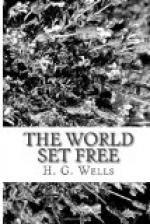This framework attracted Barnet’s attention for a time to the exclusion of other interests. It was absolutely still, it had a dead rigidity, a stricken inaction, no one was at work upon it and all its machinery was quiet; but the constructor’s globes of vacuum light filled its every interstice with a quivering green moonshine and showed alert but motionless—soldier sentinels!
He asked a passing stroller, and was told that the men had struck that day against the use of an atomic riveter that would have doubled the individual efficiency and halved the number of steel workers.
‘Shouldn’t wonder if they didn’t get chucking bombs,’ said Barnet’s informant, hovered for a moment, and then went on his way to the Alhambra music hall.
Barnet became aware of an excitement in the newspaper kiosks at the corners of the square. Something very sensational had been flashed upon the transparencies. Forgetting for a moment his penniless condition, he made his way over a bridge to buy a paper, for in those days the papers, which were printed upon thin sheets of metallic foil, were sold at determinate points by specially licensed purveyors. Half over, he stopped short at a change in the traffic below; and was astonished to see that the police signals were restricting vehicles to the half roadway. When presently he got within sight of the transparencies that had replaced the placards of Victorian times, he read of the Great March of the Unemployed that was already in progress through the West End, and so without expenditure he was able to understand what was coming.
He watched, and his book describes this procession which the police had considered it unwise to prevent and which had been spontaneously organised in imitation of the Unemployed Processions of earlier times. He had expected a mob but there was a kind of sullen discipline about the procession when at last it arrived. What seemed for a time an unending column of men marched wearily, marched with a kind of implacable futility, along the roadway underneath him. He was, he says, moved to join them, but instead he remained watching. They were a dingy, shabby, ineffective-looking multitude, for the most part incapable of any but obsolete and superseded types of labour. They bore a few banners with the time-honoured inscription: ‘Work, not Charity,’ but otherwise their ranks were unadorned.
They were not singing, they were not even talking, there was nothing truculent nor aggressive in their bearing, they had no definite objective they were just marching and showing themselves in the more prosperous parts of London. They were a sample of that great mass of unskilled cheap labour which the now still cheaper mechanical powers had superseded for evermore. They were being ’scrapped’—as horses had been ‘scrapped.’
Barnet leant over the parapet watching them, his mind quickened by his own precarious condition. For a time, he says, he felt nothing but despair at the sight; what should be done, what could be done for this gathering surplus of humanity? They were so manifestly useless—and incapable—and pitiful.




